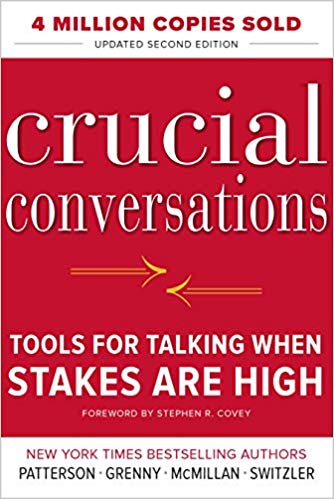

This article is an excerpt from the Shortform summary of "Crucial Conversations" by Kerry Patterson. Shortform has the world's best summaries of books you should be reading.
Like this article? Sign up for a free trial here .
What is Crucial Conversations AMPP? How can it help you learn to communicate better?
Crucial Conversations‘ AMPP acronym is a set of tools that breaks down how to listen. You can use Crucial Conversations AMPP to encourage others to share and to listen productively during difficult conversations.
What Is Crucial Conversations AMPP? Why Does it Matter?
What is AMPP in crucial conversations, and why do you need it? When others shut down or blow up (resort to silence/violence), it’s important to get them to rejoin the dialogue. You can’t work through your differences until all parties add their input to the pool of information.
While you can’t force others to participate, you can take steps to make it more comfortable for them to do so. The key to encouraging participation is letting them know it’s OK to share their path to action (their facts and stories), regardless of how controversial it might be. Here’s how to do this, and how Crucial Conversations‘ AMPP acronym can help.
Start With Heart — Listen
- Be sincere: When you ask people to share what’s on their minds, make sure you mean it and be prepared to listen. People instantly recognize insincerity.
- Be curious: When others express intense emotions, you should become curious. Wonder what’s behind the emotion — getting to the source is the only way to get back to dialogue.
- Remain curious. When people begin to share their emotionally charged or unflattering stories, it’s natural to start judging them. To avoid overreacting, maintain your curiosity. As yourself why a reasonable person would react this way. When you retrace the other person’s path, you generally understand their conclusion.
- Be patient: After others have shared their feelings and opinions, give them time to wind down before moving on with the conversation. Adrenaline stays in the bloodstream and emotions take time to dissipate.
Crucial Conversations‘ AMPP acronym can help you break down the steps to listening even further, so you have actionables in mind for when you need to stop and listen,
Crucial Conversations AMPP Skills: Encourage Others to Rethink Their Path
Others need help to retrace their path to action, but most of us fail to do this. AMPP in crucial conversations can help you see that path.
We typically enter the conversation at the end of their path, when they’re starting to act out their story (with silence or violence). Start where they are and help them work backward to the source — from feelings, to what they concluded, to what they observed.
- Break the cycle: The typical response to nonconstructive behavior is to match it. But you need to stop the cycle by stepping away from the interaction and making it safe for the other person to talk about their path to action. Help them to move away from intense feelings and reactions and return to the cause (the facts and story behind the emotion).
- Ask: When someone is upset, they have a story and facts to share. Be genuine and sincere in inviting them to share, regardless of their emotions. Listen in a way that makes it safe for them to share. They must believe they won’t offend or suffer from speaking honestly.
Crucial Conversations AMPP: How to Listen
To encourage others to share, use four listening tools: Ask, mirror, paraphrase, prime (AMPP). Crucial Conversations AMPP will help you regain focus in conversations and learn to listen closely.
Here are the steps for AMPP in crucial conversations.
A: Ask
Ask to get things going: Often all it takes to break an impasse is to seek to understand others’ views. When you show genuine interest, people feel less compelled to use silence/violence. For example, use phrases like, “What do you mean? I’d like to hear your concerns.” Other invitations include: “What’s going on?” “Please let me know if you see it differently.” “Don’t worry about hurting my feelings; I really want to hear your thoughts.”
M: Mirror
Mirror to confirm feelings: Mirroring can help build more safety. It consists of playing the role of mirror by describing to the person how they look or act. We see their actions and reflect them back.
Mirroring is most useful when the other person’s tone/gestures are inconsistent with their words.
For example, they may say, “Don’t worry, I’m fine,” when clearly they’re not fine. A mirroring response would be, “Really? It doesn’t sound like you are.” Explain that while the person may be saying one thing, his body language or tone belies it. For instance, “You look nervous about signing the contract. Are you sure you’re OK with buying this car?”
With your tone, convey that you’re OK with them feeling the way they’re feeling; respond calmly rather than being upset.
P: Paraphrase
Paraphrase to acknowledge the story: When you get a clue for why the person is feeling the way they do, you can build additional safety by paraphrasing what you heard. Don’t just parrot back what they say, but put the message in your own words in abbreviated form. For instance, “Let’s see if I’ve got this right. You’re upset because…”
Don’t react negatively. Stay focused on figuring out how a reasonable person could have concluded this. Rephrase in a way that suggests it’s OK to speak, that you’re trying to understand.
P: Prime
Prime when you’re still stalled: When you believe another person still has something to share and might do so with further encouragement, you can try priming the conversation. Offer a guess at what the other person is thinking or feeling, and she may respond. For example, “Are you thinking that the only reason we’re doing this is to make money?”
Crucial Conversations AMPP acronym can help you listen more carefully and keep an open dialogue. AMPP is a way to ensure you’re doing your part in a tough conversation and staying on track.

———End of Preview———
Like what you just read? Read the rest of the world's best summary of Kerry Patterson's "Crucial Conversations" at Shortform .
Here's what you'll find in our full Crucial Conversations summary :
- How to approach an argument without getting mad
- The mistakes most people make when trying to listen to someone else
- How to come up with win-win solutions that make everyone happy






